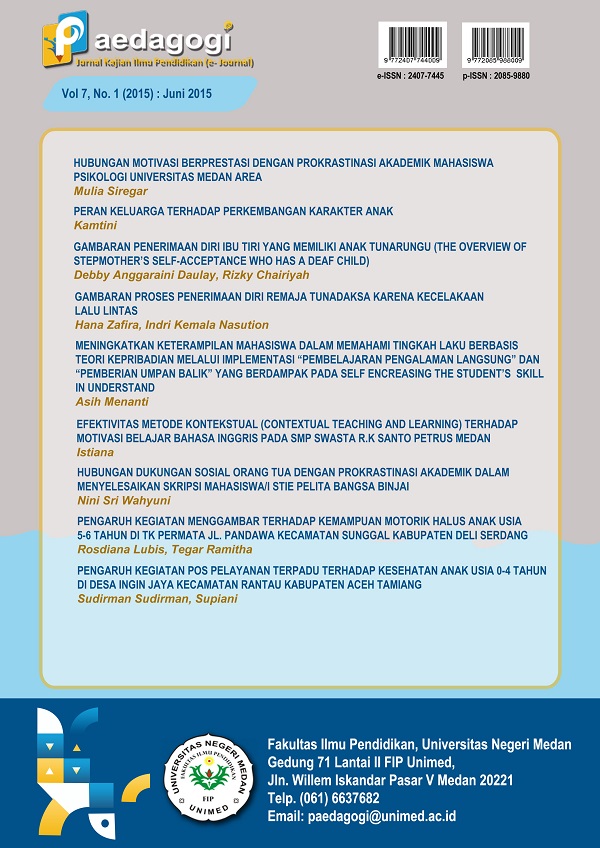MENINGKATKAN KETERAMPILAN MAHASISWA DALAM MEMAHAMI TINGKAH LAKU BERBASIS TEORI KEPRIBADIAN MELALUI IMPEMENTASI œPEMBELAJARAN PENGALAMAN LANGSUNG DAN œPEMBERIAN UMPAN BALIK YANG BERDAMPAK PADA SELF EFFICACY ENCREASING THE STUDENT™S SKILL IN UNDERSTAND
DOI:
https://doi.org/10.24114/paedagogi.v7i13.2279Abstract
ABSTRACT This study done was caused by the existing needs to be competent guidance and counseling student in understanding the student™s behavior. The objective of this study were to encrease the guidance and counseling student™s skill and knowledge in arranging and implementing instrument as well as interpreting the student™s behavior based on the personality theory. This study is classroom action research done in two cycles, each cycles consist of three time lecturing sessions. The result of this study show that the subject matter learning about understanding behavior in the subject of personality theory which implement œthe direct exspriences and œthe feedback presentation pronote the student™s competence and mastery in understanding, the student™s behavior, and influence on their self efficacy promotion. It is concluded that learning that implement, œthe direct experience and œthe feedback presentation were alternatively applicable by lectures in encreasing the student™s competence to understand behavior and to encrease self efficayy. Keywords : The understanding behavior, the direct exsprience and feedback.Downloads
Published
2015-06-27
Issue
Section
Articles
License
Copyright (c) 2015 Prof. Asih Menanti S.Psi,MS

This work is licensed under a Creative Commons Attribution-ShareAlike 4.0 International License.
Authors published with the Paedagogi: Jurnal Kajian Ilmu Pendidikan (e-journal) agree to the following terms:
- Authors retain copyright and grant the journal the right of first publication with the work simultaneously licensed under a Creative Commons Attribution License (CC BY-SA 4.0) that allows others to share the work with an acknowledgment of the work's authorship and initial publication in this journal.
- Authors are able to enter into separate, additional contractual arrangements for the non-exclusive distribution of the journal's published version of the work (e.g., post it to an institutional repository or publish it in a book), with an acknowledgment of its initial publication in this journal.
- Authors are permitted and encouraged to post their work online (e.g., in institutional repositories or on their website) prior to and during the submission process, as it can lead to productive exchanges, as well as earlier and greater citation of published work. (See The Effect of Open Access)


